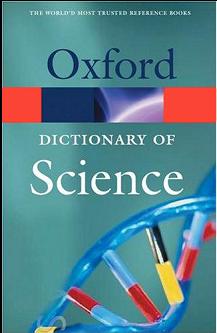A Dictionary of Science FIFTH EDITION
Oxford University Press is a department of the University of Oxford.

This
fifth edition of A Dictionary of Science, like its predecessors, aims to
provide school and first-year university students with accurate
explanations of any unfamiliar words they might come across in the
course of their studies, in their own or adjacent disciplines. For
example, students of the physical sciences will find all they are likely
to need to know about the life sciences, and vice versa. The dictionary
is also designed to provide non-scientists with a useful reference
source to explain the scientific terms that they may encounter in their
work or in their general reading.
At this
level the dictionary provides full coverage of terms, concepts, and
laws relating to physics, chemistry, biology, biochemistry,
palaeontology, and the earth sciences. There is also coverage of key
terms in astronomy, cosmology, mathematics, biotechnology, and computer
technology. In addition, the dictionary includes:
- over 160 short biographical entries on the most important scientists in the history of the subject
- ten features (each of one or two pages) on concepts of special significance in modern science
- ten chronologies showing the development of selected concepts, fields of study, and industries
- eight Appendices, including the
periodic table, tables of SI units and conversion tables to and from
other systems of units, summary classifications of the plant and animal
kingdoms, and useful websites.
For this fifth edition over 300 new entries have been added to the
text, incorporating recent advances in all the major fields and
increased coverage of climatology, seismology, and computing.
In
compiling the dictionary, the contributors and editors have made every
effort to make the entries as concise and comprehensible as possible,
always bearing in mind the needs of the readers. Particular features of
the book are its lack of unnecessary scientific jargon and its extensive
network of cross-references. An asterisk placed before a word used in
an entry indicates that this word can be looked up in the dictionary
and will provide further explanation or clarification. However, not
every word that is defined in the dictionary has an asterisk placed
before it when it is used in an entry. Some entries simply refer the
reader to another entry, indicating either that they are synonyms or
abbreviations or that they are most conveniently explained in one of
the dictionary’s longer articles. Synonyms and abbreviations are
usually placed within brackets immediately after the headword. Terms
that are explained within an entry are highlighted by being printed in
boldface type. Where appropriate, the entries have been supplemented by
fully labelled line-drawings or tables in situ.
|

